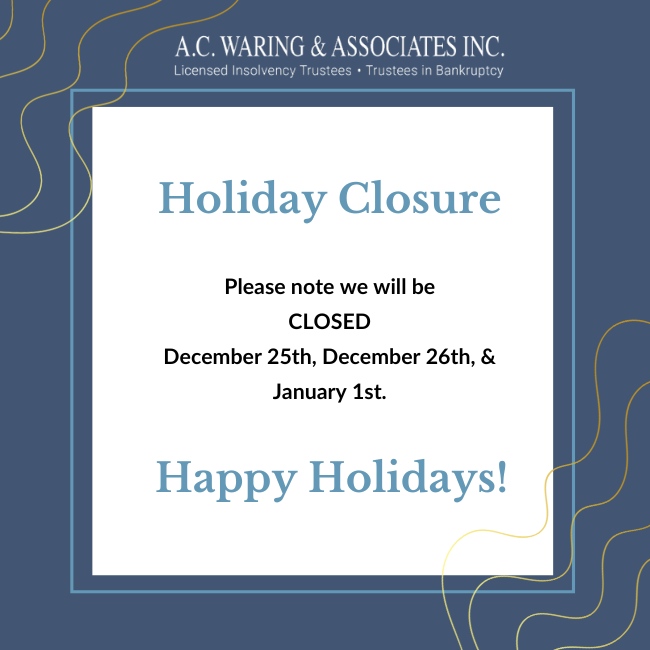Financial hardship can develop slowly or strike suddenly. A lost job, medical bills, or changes in household income can quickly lead to missed payments and rising debt. For those feeling overwhelmed, bankruptcy is sometimes seen as the only option. However, while it can be a useful legal tool, it is not always the right solution for every person or situation.
Bankruptcy may be right for you if your debt is unmanageable, and other repayment options are no longer realistic based on your income, assets, and financial goals. Understanding the role of bankruptcy and what alternatives exist can help you make a more informed choice about your financial future.
Understanding Bankruptcy in Canada
Bankruptcy in Canada is a federally regulated process that provides debt relief to individuals who are unable to repay their outstanding debts. It is administered by a licensed insolvency trustee, who guides the process from start to finish. Filing for bankruptcy can legally stop creditor calls, lawsuits, and wage garnishments. In some cases, it may also involve the surrender of non-exempt assets to repay part of the debt.
Bankruptcy as a Legal Debt Relief Option
The process is structured, transparent, and based on legislation intended to support both debtors and creditors. Once a bankruptcy is discharged, the person is released from the debts included in the process. This legal reset can provide a foundation for rebuilding credit and achieving stability.
When Bankruptcy Might Be Worth Considering
It is not always clear when bankruptcy is the right course of action. Most people wait until they are in significant distress before seeking advice. However, there are common signs that may indicate bankruptcy should be explored.
You may be in this position if you are:
- Unable to make more than the minimum payment on debts
- Facing legal action, such as wage garnishment or asset seizure
- Relying on credit to pay for daily necessities
- Feeling anxious or overwhelmed by financial pressure
- Struggling to negotiate with creditors or maintain repayment plans
Recognizing Persistent Financial Imbalance
If your debt has remained the same or increased despite making regular payments, it may indicate that your current repayment strategies are not sustainable. Bankruptcy is one option to break the cycle, but it is not the only one.
Exploring Alternatives to Bankruptcy
Bankruptcy is not the only route available for managing unmanageable debt. In fact, many people discover that they qualify for other solutions that are less disruptive and offer more flexibility. Consulting with a licensed insolvency trustee can help determine which options may be suitable based on your income, debt level, and financial goals.
Consumer Proposals as a Common Alternative
One of the most widely used alternatives in Canada is a consumer proposal. Like bankruptcy, it is a legally binding process administered by a licensed insolvency trustee. However, instead of surrendering assets, you agree to repay a portion of your debt through structured monthly payments. This option can protect your assets, reduce your total debt, and avoid some of the long-term effects of bankruptcy.
Other Debt Relief Solutions That May Be Available
There are also informal methods that may work for some people, such as:
- Debt consolidation loans that combine multiple payments into one
- Credit counselling programs that offer structured repayment plans
- Direct negotiations with creditors for reduced settlements
Each approach has different implications for credit history, cost, and eligibility. Understanding the pros and cons of each can help clarify which strategy is best for your situation.
The Impacts of Bankruptcy to Consider
While bankruptcy can stop aggressive collection action and discharge debt, it does come with consequences. These outcomes should be weighed carefully before making a final decision.
Financial & Personal Consequences of Filing
Some of the key impacts include:
- A notation on your credit report for up to seven years
- The potential loss of non-exempt assets
- Monthly payments based on surplus income guidelines
- A requirement to attend financial counselling sessions
- Difficulty accessing credit in the short term
The process also carries emotional and psychological weight for many people. Speaking with a professional can offer reassurance and context that is often missing when trying to navigate these issues alone.
When Bankruptcy May Be the Most Practical Option
Although bankruptcy is often viewed as a last resort, it can be the most realistic option in certain situations, particularly when debt has reached a critical point and income is limited.
Evaluating the Role of Income & Assets
If there is no reasonable ability to repay debt through other means, and if most available assets are non-exempt or already at risk, bankruptcy can offer a formal and structured way out. It may also be appropriate if creditors have refused to negotiate or legal action is underway.

Taking the First Step With a Confidential Consultation
Deciding what to do when facing unmanageable debt can be difficult, but you do not have to make the decision alone. A confidential consultation with a licensed insolvency trustee can be an opportunity to understand your options, ask questions, and develop a plan. Whether or not bankruptcy is the right fit, speaking with a professional often brings clarity to what has felt uncertain or overwhelming.
Discovering the Right Path Forward
In many cases, that first conversation opens the door to alternatives that had not been previously considered. Options such as the Debt-Stop process, a customized repayment plan, or a consumer proposal may better suit your financial needs and lifestyle. With trusted, regulated advice, you can make informed decisions with confidence and care.
Making an Informed Financial Decision
Bankruptcy is a legal solution, not a personal failure. In the right situation, it can provide an opportunity to reset and rebuild. That said, it is just one option among many. The most important step is gaining a full understanding of what is available and how each path can affect your future.
A.C. Waring & Associates is dedicated to helping Albertans make informed decisions about their debt. Their experience, professionalism, and supportive approach provide the foundation for a stable financial future, regardless of the option you choose.
Learn more or book a consultation with us today.





